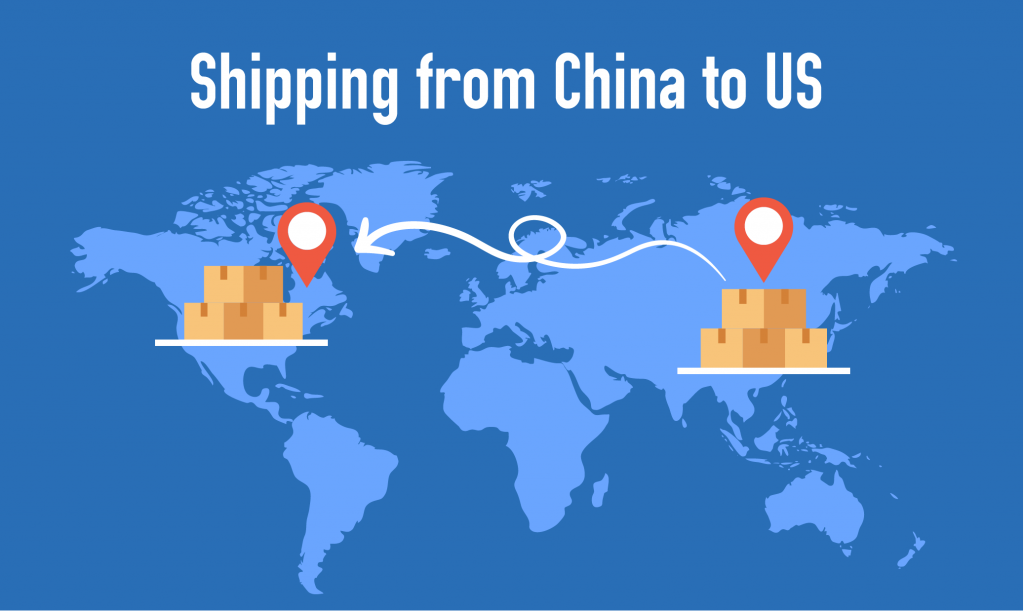Are you looking to navigate the complex world of shipping agents from China to the USA? Understanding the pivotal role these agents play in international trade is essential for both businesses and individuals. In this article, we will explore the importance of shipping agents, the various shipping options available, and the key factors to consider when selecting the right agent for your needs. Additionally, we’ll delve into customs clearance, cost considerations, and best practices for importing goods. Get ready to streamline your shipping process and ensure successful deliveries!

Understanding the Role of Shipping Agents
The Importance of Shipping Agents in International Trade
In the realm of international trade, shipping agents play a pivotal role in facilitating the smooth movement of goods across borders. They act as intermediaries between importers and exporters, navigating the complexities of logistics, customs, and regulations. This is particularly vital for businesses looking to import goods from China to the USA, where understanding the nuances of both countries’ shipping protocols can significantly impact the efficiency and cost-effectiveness of the operation.
By leveraging their expertise, shipping agents help businesses to avoid potential pitfalls in the shipping process, reduce delivery times, and manage costs effectively. According to Statista, the international logistics market size is projected to grow steadily, emphasizing the essential function of shipping agents in a globalized economy (source: Statista).
Key Responsibilities of Shipping Agents
Shipping agents have a wide range of responsibilities that are critical to the successful importation of goods. These include:
Coordination of Shipping Arrangements: Shipping agents handle the logistics of getting goods from the supplier in China to the intended destination in the USA, utilizing various modes of transportation such as ocean freight, air freight, or rail freight.
Customs Documentation: They prepare and manage all necessary documentation required for customs clearance, ensuring compliance with regulations and minimizing the risk of delays.
Tracking and Communication: Shipping agents provide ongoing updates regarding shipment status, ensuring that importers are informed at every stage of the process.
Negotiation of Freight Rates: They often negotiate favorable shipping rates with carriers, which can lead to significant cost savings for businesses.
Problem Resolution: In case of any issues that arise during transit—such as delays, damage, or customs hold-ups—shipping agents act quickly to resolve these problems effectively.
Types of Shipping Options from China to the USA
When importing goods from China to the USA, businesses have several shipping options to consider, each catering to different needs based on urgency, volume, and budget constraints.
Air Freight: Fast and Efficient Shipping Solutions
Air freight is the fastest shipping option available, ideal for businesses needing to import goods quickly. It typically takes 3-7 days for shipments to arrive, depending on the specific routes and customs processes involved. Although more expensive than other shipping methods, the speed of delivery can justify the costs, especially for high-value or perishable items. Here’s a simple comparison of air freight shipping costs for different weight categories:
| Weight Category | Estimated Cost (USD) | Estimated Transit Time |
|---|---|---|
| 0-100 kg | $500 – $1,200 | 3-5 days |
| 100-500 kg | $1,200 – $3,000 | 5-7 days |
| 500 kg and above | $3,000+ | 5-10 days |
Sea Freight: Cost-Effective Options for Bulk Shipments
Sea freight is the most economical option for shipping large volumes of goods. While it takes longer—typically between 20-40 days depending on the destination port—it is ideal for bulk shipments that do not require immediate delivery. This method is particularly advantageous for businesses importing large quantities of products at a lower cost, making it a popular choice among importers.
Pricing for sea freight can vary based on the size of the shipment and the shipping route. Below is a general cost comparison for different container sizes:
| Container Size | Estimated Cost (USD) | Estimated Transit Time |
|---|---|---|
| 20-foot | $1,200 – $2,500 | 20-30 days |
| 40-foot | $2,500 – $4,500 | 25-40 days |
| 40-foot HQ | $4,500 – $7,000 | 25-40 days |
Express Shipping: Quick Delivery for Urgent Needs
For time-sensitive shipments that require rapid delivery, express shipping is a viable option. This method combines elements of air and courier services for expedited delivery, typically within 1-3 days. While this is often the most expensive option, companies that prioritize speed and reliability often find it worthwhile, especially for urgent orders. Here’s a general overview of express shipping costs:
| Weight Category | Estimated Cost (USD) | Estimated Transit Time |
|---|---|---|
| 0-10 kg | $100 – $200 | 1-2 days |
| 10-30 kg | $200 – $400 | 1-2 days |
| 30 kg and above | $400+ | 1-3 days |
In summary, when choosing a shipping option from China to the USA, businesses must balance their needs for speed, cost, and volume. Consulting with a professional like Dantful International Logistics, a highly professional, cost-effective, and high-quality logistics service provider, can help in making informed decisions that suit specific requirements.
READ MORE:
- Shipping From China to the USA
- Shipping From China TO Canada
- Shipping From China TO Mexico
- Shipping From China to Panama
- Shipping From China to Costa Rica
- Shipping From China to Brazil
- Shipping From China TO Colombia
- Shipping From China to Jamaica
- Shipping From China to Venezuela
- Shipping From China to Argentina
Choosing the Right Shipping Agent
Factors to Consider When Selecting a Shipping Agent
When looking for a shipping agent to facilitate your importation from China to the USA, several crucial factors must be considered to ensure a seamless and efficient shipping experience.
Experience and Expertise: Choose a shipping agent with extensive experience in handling shipments from China, especially to the USA. Their familiarity with customs regulations and import procedures can significantly enhance the efficiency of your shipping process.
Range of Services: Opt for a shipping agent that offers a comprehensive suite of services, including Ocean Freight, Air Freight, Customs Clearance, and Door-to-Door Delivery. This one-stop approach not only simplifies logistics but also ensures better coordination.
Reputation and Reviews: Research the reputation of potential agents through online reviews, testimonials, and industry ratings. A highly regarded shipping agent, such as Dantful International Logistics, is known for providing reliable and cost-effective solutions tailored to meet the needs of global traders.
Customer Support: Effective communication is essential in logistics. Choose a shipping agent that provides robust customer support and can promptly address your inquiries or concerns throughout the shipping process.
Cost-Effectiveness: While affordability is important, make sure that the shipping agent offers transparent pricing without compromising on service quality. Compare quotes from multiple agents to identify the best value for your specific shipping needs.
Questions to Ask Your Shipping Agent
When selecting a shipping agent, asking the right questions can provide deeper insights into their operations and capabilities. Consider the following inquiries:
What shipping methods do you offer?
- Understanding whether the agent provides Air Freight, Sea Freight, or other options helps you choose the best method for your shipment needs.
What is your process for customs clearance?
- This question allows you to gauge the agent’s familiarity with customs regulations and their ability to navigate any challenges that may arise.
Can you provide references from previous clients?
- A reputable agent should be able to provide references or case studies that demonstrate their success in handling similar shipments.
What are your payment terms and conditions?
- Clarity on payment structures, including deposits, balance payments, and potential hidden fees, is essential for budgeting.
How do you handle unexpected delays or issues?
- This question assesses the agent’s problem-solving capabilities and their communication approach in times of crisis.
Evaluating Shipping Agent Credentials and Experience
When assessing potential shipping agents, it is critical to evaluate their credentials and experience. Here are some steps to follow:
Licenses and Certifications: Confirm that the shipping agent holds all necessary licenses and certifications required for international shipping. This includes adherence to regulations set forth by agencies such as the Federal Maritime Commission (FMC) and Customs and Border Protection (CBP) in the USA.
Industry Affiliations: Look for agents affiliated with professional organizations such as the International Federation of Freight Forwarders Associations (FIATA) or the American Association of Exporters and Importers (AAEI). These affiliations often indicate a commitment to industry standards and best practices.
Experience in Your Specific Industry: Consider whether the agent has experience in your specific industry, as this can influence their understanding of unique shipping requirements and challenges.
Track Record of Successful Shipments: Ask for data on their previous shipping volumes and the success rate of on-time deliveries. A high success rate indicates reliability and effectiveness.
Continuous Training and Development: Ensure that the shipping agent engages in regular training and development to stay updated with the latest regulations and technologies in the logistics sector.
Customs Clearance and Regulations
Understanding Customs Procedures for Imports
Navigating customs procedures can be one of the most challenging aspects of importing goods from China to the USA. Here’s an overview of key customs procedures:
Documentation Requirements: Importers must prepare various documents, including the Commercial Invoice, Packing List, and Bill of Lading. Accurate and complete documentation is essential to avoid delays.
Classification of Goods: Properly classifying imported goods according to the Harmonized System (HS) codes is crucial, as it determines applicable duties and taxes.
Customs Duties and Taxes: Be prepared to pay customs duties based on the declared value of your goods. Understanding the duty rates for your specific products can help with budgeting.
Compliance with Regulations: Make sure your imports comply with all relevant regulations enforced by agencies such as the Food and Drug Administration (FDA) and Environmental Protection Agency (EPA), depending on the nature of the goods.
Common Challenges in Customs Clearance
While customs clearance is vital for any import process, it often presents several challenges such as:
Inaccurate Documentation: Errors in paperwork can lead to significant delays, fines, or even the confiscation of goods.
Customs Inspections: Random inspections can slow down the release of your shipment, particularly if there are discrepancies in the documentation.
Understanding Tariff Changes: Tariff rates can change, and keeping updated on these changes is essential to avoid unexpected costs.
Regulatory Compliance: Failing to comply with all relevant regulations can lead to penalties or shipment delays.
Tips for Smooth Customs Clearance
To facilitate smooth customs clearance, consider the following strategies:
Engage a Qualified Shipping Agent: Partnering with a knowledgeable shipping agent like Dantful International Logistics can streamline the customs process through their expertise.
Double-Check Documentation: Ensure that all required documents are accurate and complete before submission to avoid delays.
Stay Informed: Keep abreast of changes in customs regulations and tariff rates that may affect your imports.
Be Responsive: Promptly address any inquiries or requests from customs authorities to minimize clearance delays.
Plan Ahead: Anticipate potential customs challenges by allowing extra time in your shipping schedule to accommodate any unforeseen issues.
By carefully considering these factors and employing best practices, you can enhance your shipping experience and ensure a successful importation process from China to the USA.
Cost Considerations in Shipping
Breakdown of Shipping Costs
When importing goods from China to the USA, understanding the various components of shipping costs is essential for effective budgeting. Shipping costs can be broken down into several key categories:
| Cost Component | Description |
|---|---|
| Freight Charges | The base fee paid to transport goods via air freight from china to usa or sea freight. |
| Customs Duties and Taxes | Fees imposed by the U.S. government based on the value of the goods. |
| Insurance Costs | Optional costs to protect goods during transit against loss or damage. |
| Handling Fees | Charges for the loading and unloading of goods at ports and warehouses. |
| Storage Fees | Costs incurred for storing goods before or after shipping. |
| Documentation Fees | Charges for preparing necessary shipping and customs documents. |
Understanding these components can help you anticipate total costs and avoid surprises. For instance, while air freight is generally faster, it is often more expensive compared to ocean freight, making it crucial to choose the right method based on your budget and timelines.
How to Negotiate Rates with Shipping Agents
Negotiating shipping rates with agents can significantly affect your overall import costs. Here are several strategies to consider:
Research Market Rates: Familiarize yourself with current shipping rates from China to the USA by comparing quotes from multiple shipping agents, including Dantful International Logistics. This knowledge empowers you during negotiations.
Consolidate Shipments: If possible, consolidate smaller shipments into one larger shipment. This can lower costs per unit due to economies of scale.
Establish Long-Term Relationships: Building a rapport with your shipping agent can lead to better rates. Agents are more likely to offer discounts to clients they know will provide repeat business.
Be Flexible with Shipping Dates: If your timeline allows, consider shipping during off-peak seasons when rates are generally lower due to decreased demand.
Discuss Volume Discounts: If you plan to import regularly, inquire about volume discounts. Shipping agents often provide better rates for clients who provide consistent business.
Hidden Fees to Watch Out For
While negotiating rates, be aware of potential hidden fees that can impact your total shipping costs. Here are some common hidden fees to watch for:
| Hidden Fee | Description |
|---|---|
| Documentation Fees | Charges for preparing specific documents required for customs clearance. |
| Terminal Handling Charges | Fees for handling cargo at the port, which can vary significantly by location. |
| Fuel Surcharges | Additional fees due to fluctuations in fuel prices, often applied unexpectedly. |
| Cancellation Fees | Charges incurred if you need to change or cancel a shipment after it has been booked. |
| Currency Conversion Fees | Costs associated with currency exchange, if payments are made in a different currency. |
To avoid surprises, always request a detailed breakdown of all potential charges from your shipping agent before finalizing the shipping agreement.
Best Practices for Importing Goods from China
Packaging and Labeling Requirements
Proper packaging and labeling are crucial for smooth shipping and customs clearance. Consider the following best practices:
Use Durable Materials: Ensure that packaging is robust enough to withstand rough handling during transit. This helps protect your goods from damage.
Label Clearly: Each package should have clear labels that include the recipient’s name, address, and contact information. Additionally, include handling instructions such as “Fragile” or “This Side Up”.
Comply with Regulations: Familiarize yourself with U.S. Customs and Border Protection (CBP) regulations regarding packaging materials and labeling requirements to avoid delays.
Documentation Needed for Importing Goods
Proper documentation is vital for successful customs clearance. Key documents required for importing goods from China include:
| Document | Description |
|---|---|
| Commercial Invoice | A detailed invoice that includes the transaction value, description of goods, and terms of sale. |
| Bill of Lading | A shipping document issued by the carrier that serves as a receipt for goods and a contract for transport. |
| Packing List | A detailed list of items included in the shipment, useful for customs inspection. |
| Import License | (If applicable) A government-issued document allowing the import of specific goods. |
| Customs Declaration | A form submitted to customs outlining the cargo’s details, value, and compliance with regulations. |
Ensuring that all documentation is accurate and complete can prevent delays and extra costs during the import process.
Tracking Shipments: Tools and Techniques
Effective shipment tracking is essential for maintaining transparency and managing expectations. Here are tools and techniques to help you track your shipments:
Online Tracking Systems: Most shipping agents, including Dantful International Logistics, offer online tracking tools. These systems allow you to monitor your shipment’s status in real-time.
Mobile Apps: Utilize mobile applications provided by shipping agents for on-the-go tracking. These apps often feature notifications for key updates.
Email Alerts: Request email alerts from your shipping agent regarding shipment progress, customs clearance, and estimated delivery times.
Communication with Your Agent: Maintain open lines of communication with your shipping agent. Regular updates and inquiries can provide additional insights into your shipment’s status.
By implementing these best practices, you can streamline your importing process and enhance the overall efficiency of your supply chain. As a Highly Professional, Cost-effective And High-quality One-Stop International Logistics Service Provider For Global Traders, Dantful International Logistics is here to support you every step of the way.

Young Chiu is a seasoned logistics expert with over 15 years of experience in international freight forwarding and supply chain management. As CEO of Dantful International Logistics, Young is dedicated to providing valuable insights and practical advice to businesses navigating the complexities of global shipping.





















 Afrikaans
Afrikaans Shqip
Shqip አማርኛ
አማርኛ العربية
العربية Հայերեն
Հայերեն Azərbaycan dili
Azərbaycan dili Euskara
Euskara Беларуская мова
Беларуская мова বাংলা
বাংলা Bosanski
Bosanski Български
Български Català
Català Cebuano
Cebuano Chichewa
Chichewa 简体中文
简体中文 繁體中文
繁體中文 Corsu
Corsu Hrvatski
Hrvatski Čeština
Čeština Dansk
Dansk Nederlands
Nederlands English
English Esperanto
Esperanto Eesti
Eesti Filipino
Filipino Suomi
Suomi Français
Français Galego
Galego ქართული
ქართული Deutsch
Deutsch Ελληνικά
Ελληνικά Kreyol ayisyen
Kreyol ayisyen Harshen Hausa
Harshen Hausa Ōlelo Hawaiʻi
Ōlelo Hawaiʻi עִבְרִית
עִבְרִית हिन्दी
हिन्दी Hmong
Hmong Magyar
Magyar Íslenska
Íslenska Igbo
Igbo Bahasa Indonesia
Bahasa Indonesia Gaeilge
Gaeilge Italiano
Italiano 日本語
日本語 Basa Jawa
Basa Jawa ಕನ್ನಡ
ಕನ್ನಡ Қазақ тілі
Қазақ тілі ភាសាខ្មែរ
ភាសាខ្មែរ 한국어
한국어 كوردی
كوردی Кыргызча
Кыргызча ພາສາລາວ
ພາສາລາວ Latin
Latin Latviešu valoda
Latviešu valoda Lietuvių kalba
Lietuvių kalba Lëtzebuergesch
Lëtzebuergesch Македонски јазик
Македонски јазик Malagasy
Malagasy Bahasa Melayu
Bahasa Melayu മലയാളം
മലയാളം Maltese
Maltese Te Reo Māori
Te Reo Māori मराठी
मराठी Монгол
Монгол ဗမာစာ
ဗမာစာ नेपाली
नेपाली Norsk bokmål
Norsk bokmål پښتو
پښتو فارسی
فارسی Polski
Polski Português
Português ਪੰਜਾਬੀ
ਪੰਜਾਬੀ Română
Română Русский
Русский Samoan
Samoan Gàidhlig
Gàidhlig Српски језик
Српски језик Sesotho
Sesotho Shona
Shona سنڌي
سنڌي සිංහල
සිංහල Slovenčina
Slovenčina Slovenščina
Slovenščina Afsoomaali
Afsoomaali Español
Español Basa Sunda
Basa Sunda Kiswahili
Kiswahili Svenska
Svenska Тоҷикӣ
Тоҷикӣ தமிழ்
தமிழ் తెలుగు
తెలుగు ไทย
ไทย Türkçe
Türkçe Українська
Українська اردو
اردو O‘zbekcha
O‘zbekcha Tiếng Việt
Tiếng Việt Cymraeg
Cymraeg יידיש
יידיש Yorùbá
Yorùbá Zulu
Zulu